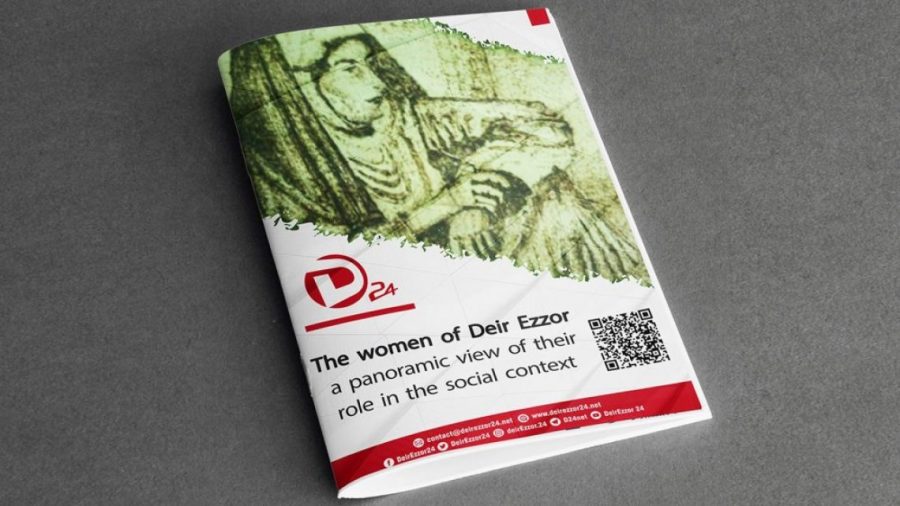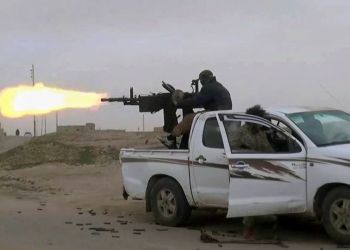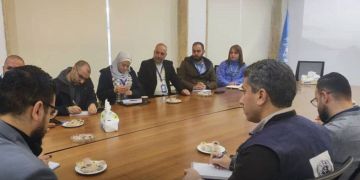This post is also available in:
![]() العربية
العربية
Women have played a big role throughout history, but this role has ranged between leadership and subordination. We have seen their role in the myth (Ishtar), but this role was devalued after the growing domination of men. We also saw them in power as queen Zenobia, but this role in leadership fade away and they became subordinate during the era of decline, when males dominated all the key areas of society. This applies to women at all times and places since ancient times, where their role has fluctuated up and down as mentioned above.
The women of the Euphrates are not separated from this historical context of the women role in general, however, the women of Deir Ezzor province have played leading roles, perhaps due to the deep roots of this civilized region, as it has been ruled by many successive civilizations, or maybe due to the nature of their society, which is made up of a mixture of bedouin and urban population, and maybe, the nature of the region’s agricultural economy has played the most prominent role in forming the women leading qualities despite the tribalism prevailing in the Deir Ezzor society, which gives an initial impression that it is a male society, but we find that each tribe has a branch in the name of a woman like (Hadla, Sabha, Saada..), all of them are names of women who have left their mark on society, this, if anything, indicates that these tribes are proud of their women pioneers in the countryside and city, for example, we hear in the region the popular expression “he is his sister’s brother” to indicate the man’s skill and courage.
The people of the city have been known for taking pride of the gallantry of “Batta’s brothers”, which brings back the memory of (Batta al-Haj Kaddour), one of the women of Deir Ezzor who stood against the French colonizers, and inspired her countrymen in fighting. We also cannot forget (Fatima al-Jathmour) who was arrested by the French for blowing red peppers in the eyes of their soldiers as they were chasing rebels. In addition to many other brave women in the countryside and the city, whether in the past or in the present time. Deir Ezzor’s women’s role was not limited to this aspect of struggle against occupiers but also to other aspects, and in addition to being housewives, they worked with men in agriculture, and their participation in this field is more than 50 per cent. They grow and harvest crops, in addition to taking care of livestock, working in dairy industry, and preparing supplies for winter like tomato paste, dried vegetables, bulgur and so on, moreover, they weave carpets and work in other professions, getting economic return that helps their families and gives them some economic independence.
Since the 1940s, the rural women have not been absent from education. Girls from different parts of Deir Ezzor countryside have been going to school and graduating as teachers, such as the teacher (Omiya Al-Basri) from Al-Mayadeen city, and many other girls who had the opportunity to complete their education and move to the capital, such as the novelist Dr. (Maya al-Rahbi).
In Deir Ezzor community, the countryside in particular, the proportion of educated women has increased, reaching very high numbers over the past two decades, and in the city, since long ago, the women of Deir Ezzor have been working in the fields of education the (Khoja) such as (Fatima Khanem) from Armenian origin. They also worked in medicine (herbal medicine, and al-Kashasha), in beauty care field such as the professions of (Sammada and Hafafah) and in midwifery, as well as in weaving rugs and carpets, spinning and weaving wool. They also worked as tailors, embroiderers, and makers of abayas (the folkloric symbol of the women of the region.)
Through all these professions, women played a big role in building their families and society. They moved towards education and achieved great success, in this field we can name “Aida Azzawi”, the first female doctor to graduate from western Germany, and “Lamiaa al-Jawhari”, the first female doctor to graduate from Damascus University and specialize in France, and we can’t ignore the pioneer of education, the first teacher “Labiba Hosni Al-Dakhil” and the first lawyer “Zahra al-Hafiz”.
The women of Deir Ezzor and its countryside have also excelled in literature and art, such as the writer “Shatha Barghout”, the first woman to release a collection of stories in the eastern region in 1994, and the first woman in the region to become a member of the Arab Writers Union in 1997, in addition to the sisters “Mandil” and the poet “Tamadhor al-Muwah”, and the painter “Itab Huraib” and many others.
In all that we have mentioned, The glorious women of Deir Ezzor have showed excellence in all fields, which proves the popular saying of the province’s people about the women of this region: “the women of Deir Ezzor are sisters of men”.
By:
Safa Al-Turki










